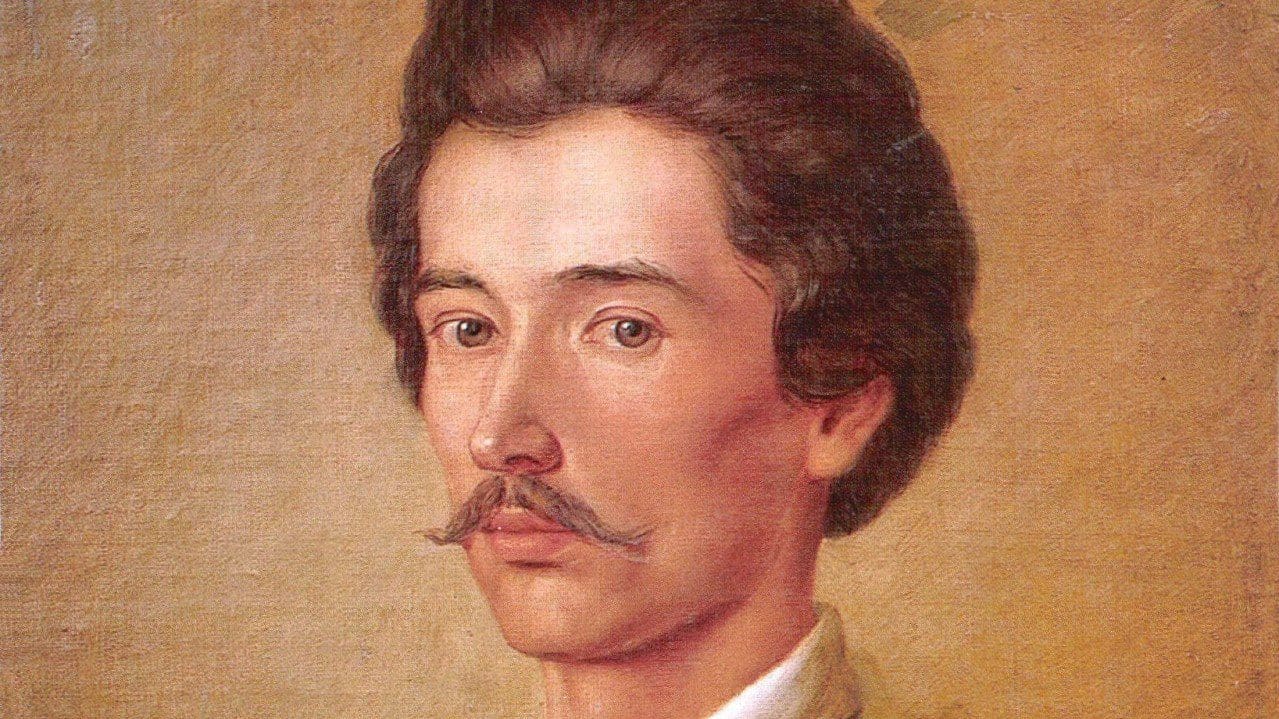This article by Tamás Fonay was published in Hungarian on Corvinák, the knowledge base of Mathias Corvinus Collegium.
If you ask someone about poetry in Hungary today, most Hungarians will think of Petőfi. However, Sándor Petőfi was not just a poet, but a freedom fighter and dreamer as well who became a national hero despite being only 26 years old at the time of his death. Despite his (poetic) fame spanning generations, there has been and continues to be much debate about both his personal life and his work.
Petőfi is now such a controversial figure in Hungarian cultural history that everything and its opposite can be said about him. In the eyes of some, he was a selfish and pompous man who wrote popular, poor poetry; while others find him modest, reserved and taciturn, who also held republican views. So, on the occasion of the bicentenary of his birth, we are justified in asking: who is the person after whom a square or a street is named in almost every town in the country? What is his body of work like? How did he achieve such a reputation in Hungary, the ‘land of ten million freedom fighters’, that his name is known even beyond the country’s borders?
The Life and Poetry of Petőfi
Sándor Petőfi was born as Sándor Petrovics to a family of Slovakian ancestry in Hungary, but he always declared himself and identified as Hungarian. At the age of 18, he gave up his studies and started working as an assistant at the National Theatre, while also appearing in extra roles. Later, he joined a company of travelling actors and took part in various plays. Between 1839 and 1841 he served in the army, then returned to the travelling theatre troupe.
It was around this time, around 1842, that his first poem was published by József Bajza, a poet and one of the most important editors of the time, the publisher of the Athenaeum literary journal. Due to a constant shortage of funds, he supported himself mainly by translations until 1844. In February 1844, he collected his poems in a volume and asked for help in publishing it from one of the greatest Hungarian poets of the time, Mihály Vörösmarty, who recognised Petőfi’s talent. Thus Vörösmarty persuaded the ‘National Circle’ of intellectuals and wealthy citizens of Pest to support the publication of Petőfi’s first book of poetry, which later became a great success with readers. With his poems being published in various newspapers and his simple, authentic style, he quickly became one of the country’s best-known poets. Petőfi’s success, however, was greeted with resentment by some intellectuals in Pest. Some were offended by his quick success, or even by the unconventional originality of his poems, which they felt were poor. After some time, regular smear campaigns were launched against him from these circles.
His disappointments in love and the many, often unjustified, attacks on his art and character brought back bitter memories of his earlier sufferings. These had left him with a sense of pessimism, which had a noticeable effect on his works from 1845 and early 1846. Nevertheless, the autumn of 1846 marked the beginning of the most important period of his life and work. It was then that he met his future wife, Júlia Szendrey, who further enriched his personality and revitalised his poetry. His love of his country grew stronger with his love for Júlia Szendrey, and the patriotic and political side of his poetry fully developed. Meanwhile, he continued to draw inspiration from his old motifs and feelings, from the purity of an almost childlike love.
The Role of Sándor Petőfi in the 1848 Revolution
Until March 1848, Petőfi continued his work, enjoyed his fame, and took pleasure in his new marriage. He also became increasingly politically active through his poetry. On 15 March 1847, the Opposition Party was founded in Pest as part of the National Opposition Conference, uniting the various fractions of the reformist opposition in Hungary. At the end of their inaugural meeting, Petőfi recited his poem In the Name of the People (A nemzet nevében). The poet, who was a revolutionary and whose work was dominated by the ideals of freedom, equality, and fraternity, later played a leading role in the youth movement in Pest, which was influenced by the deliberations of the Parliament in Bratislava (Pozsony), the Paris Revolution in February, and the Vienna Revolution. On 13 March, Petőfi wrote the National Song (Nemzeti Dal) in preparation for the National Assembly, originally scheduled for 19 March.
The news of the Vienna Revolution of ’48, which broke out on 14 March, spread like wildfire in Pest, so the young people, led by Petőfi, took action at their home base, the Pilvax Café. In the early morning of 15 March, together with their comrades, they proclaimed the 12 points they had worked out the day before, with the demands of the youth of Pest. They also spread copies of the National Song among the citizens. These demands and the uncensored printing of the National Song were a clear expression of popular will and the first free press products. Both were accordingly received with outstanding enthusiasm by the citizens. Petőfi recited his poem in person that very morning in the Pilvax Café and later in the courtyard of the University of Medicine, setting off an avalanche of national fervour and giving a burst of impetus to the masses of the revolution.
As the revolutionary events unfolded, however, Petőfi became increasingly radical and dissatisfied with the achievements of the liberal Hungarian nobility and the policies they had represented. In addition, the French Revolution had led to a particular enthusiasm for republican ideas, advocacy of freedom for the whole world, and a full-scale struggle against the idea and institution of kingship, which caused his popularity to decline among both the Hungarian population and national decision-makers. In the end, it is believed that he died in the War of Independence against the Habsburgs on 31 July 1849 near Sighisoara (Segesvár).
The Impact of His Life and Work
During the six years of his poetic career, Petőfi wrote nearly a thousand poems in Hungarian, of which some 850 have survived as significant chapters in the history of Hungarian literature. Petőfi is also the most important representative of Hungarian Romanticism, who introduced previously unknown motifs into Hungarian poetry. He was the first to engage in family poetry, writing love poems depicting love between spouses, and the first representative of landscape poetry, with his remarkable portrayal of the Hungarian lowlands and the countryside. Petőfi also struck a completely new chord in Hungarian literature. He addressed everyone in a simple and understandable way, because he placed thought at the centre of his works, not the format of the poems, while using the vernacular of the people.
Petőfi became a central figure in national legends as the leader of the March Youth and one of the heroes of 15 March, and later as one of the many who lost their lives while fighting in the 1848–1849 War of Independence. His life and his role in the revolution became as much a part of the Petőfi cult as his poetry.
Looking back on the last two centuries or so of Hungarian history, Petőfi seems to be a contemporary figure. Not only was he the most progressive and modern poet of his time, but he lived a life that made it easy for his readers to identify with him even in his later years. His revolutionary spirit lives on to this day, and the flame of his love is still burning. What he felt to be a tragedy is still overwhelming today, and his humour still exudes a sense of fun. We should also not forget that his fight for Hungarian independence is both a warning and an inspiring model at a time when the Hungarian people are enjoying the greatest freedom they have had in recent centuries.
The importance of Petőfi’s role in Hungarian history and poetry is also reflected in the fact that, on the occasion of the bicentenary of his birth in Hungary, the life and work of the poet will be commemorated for a whole year with numerous programmes, exhibitions, and performances, so that his message can be passed on to future generations. He will most likely be still remembered even a hundred years from now as the defining poet and freedom fighter of the Hungarian nation.
Click here to read the original article








